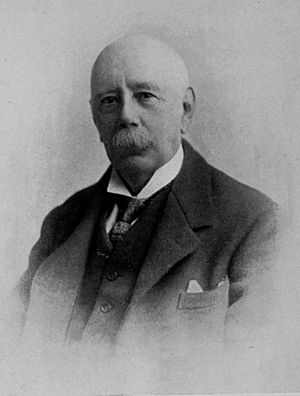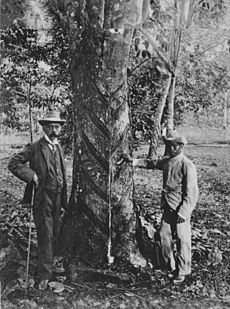Henry Nicholas Ridley facts for kids
Quick facts for kids
Henry Nicholas Ridley
|
|
|---|---|
 |
|
| Born | 10 December 1855 West Harling, Norfolk
|
| Died | 24 October 1956 (aged 100) Kew, London
|
| Nationality | British |
| Known for | Rubber industry on the Malay peninsula |
| Awards | Linnean Medal (1950) Fellow of the Royal Society |
| Scientific career | |
| Fields | Botany |
| Institutions | Singapore Botanic Gardens |
| Author abbrev. (botany) | |
Henry Nicholas Ridley (born December 10, 1855 – died October 24, 1956) was an English scientist. He was a botanist (someone who studies plants), a geologist (someone who studies rocks and the Earth), and a naturalist (someone who studies nature). He spent a lot of his life in Singapore. Ridley was very important in helping to grow rubber trees in the Malay Peninsula. He was so passionate about it that people called him "Mad Ridley"!
His Life and Work
Henry Ridley was born in West Harling, England. His father was a church leader. When Henry was three, his mother passed away. His family then moved to Cobham.
Henry loved collecting insects from a young age. He even published a list of animals and insects from his school, Haileybury College. He later studied at Exeter College, Oxford where he learned about animals, plants, and geology.
After college, he worked at the British Museum. He studied a group of plants called monocotyledons. He also traveled around Europe. In 1887, he joined an important trip to an island called Fernando de Noronha off Brazil. He studied the plants and animals there.
In 1888, Ridley became the director of Gardens and Forests in Singapore. This was a big job! He was the first scientist to lead the Singapore Botanic Gardens. His main goal was to bring new plants that could be useful for the economy.
One of his biggest achievements was finding better ways to collect latex (the milky sap) from rubber trees. These trees had been brought to Singapore ten years earlier. Ridley also started a section for animals in the gardens. He explored many areas around Singapore, like Penang and Malacca.
Ridley spent many years trying to convince people to grow rubber trees for money. He was so enthusiastic about it that he earned the nickname "Mad Ridley." In 1895, he found a way to collect rubber sap without hurting the trees too much. This method helped the rubber industry grow a lot.
Thanks to Ridley, the rubber industry became very successful in the Malay peninsula. He lived there for twenty years. After 1898, more and more people started growing rubber trees. A Chinese landowner, Tan Chay Yan, successfully grew 40 acres of rubber trees, which encouraged others.
Ridley also studied the plants of the region. He collected many different types of plants. In 1911, he returned to England. He worked on a huge five-volume book about the plants of the region, which was published between 1922 and 1925.
In 1930, he published another important book about how plants spread their seeds. This book was based on his own observations and many other studies. On his 100th birthday in 1955, he received a visit from an important leader from Malaya.
Henry Ridley married Lily Eliza Doran when he was 83 years old. He passed away in Kew, England, on October 24, 1956, just before his 101st birthday.
Species Named After Him
Many plants and animals have been named after Henry Ridley to honor his work. When a species is named after someone, it's called an eponymous species.
Some species named after him include:
- Diospyros ridleyi
- Stenolepis ridleyi
- Amphisbaena ridleyi
There's also a type of sea turtle called the olive ridley sea turtle. Some people thought it was named after him, but there isn't enough proof. It's more likely that the turtle's name comes from the word "riddle."
In 1913, a botanist named Rudolf Schlechter named a type of orchid Ridleyella after him. This plant is found only in New Guinea.
Later, in 1998, two other botanists named a group of about 30 flowering plants Ridleyandra in his honor. These plants are found in Borneo, Malay, and Thailand.
See also
- All pages with titles containing "Ridleyi"
 | Janet Taylor Pickett |
 | Synthia Saint James |
 | Howardena Pindell |
 | Faith Ringgold |


